- Home
- Fyodor Dostoyevsky
The Eternal Husband
The Eternal Husband Read online
THE ETERNAL HUSBAND
by Fyodor Dostoyevsky
I: Velchaninov
Summer came—and Velchaninov, beyond all expectation, stayed in Petersburg. His trip to the south of Russia fell through, and there was no end to his case in sight. This case— a lawsuit over an estate—was taking a most nasty turn. Three months earlier it had looked quite uncomplicated, all but indisputable; but everything had changed somehow suddenly. "And generally everything has begun to change for the worse!"—Velchaninov began repeating this phrase to himself gloatingly and frequently. He hired a clever, expensive, famous lawyer, and did not mind the cost; but in impatience and from insecurity he got to busying himself with the case as well: read and wrote documents which the lawyer uniformly rejected, kept running around to various offices, made inquiries, and most likely hindered everything considerably; at least the lawyer complained and urged him to go to the country. But he could not even make up his mind to go to the country. The dust, the stuffiness, the white nights of Petersburg, which chafed his nerves—this was what he enjoyed in Petersburg. His apartment, recently rented, was somewhere near the Bolshoi Theater, and this, too, had not worked out; "nothing works out!" His hypochondria was increasing day by day; but he had long been inclined to hypochondria.
This was a man who had lived much and broadly, now far from young, about thirty-eight or even thirty-nine, and all this "old age"—as he himself put it—had come upon him "almost quite unexpectedly"; but he understood himself that he had aged not in the quantity, but rather, so to speak, in the quality of his years, and that if his infirmities had indeed begun, it was rather from within than from without. By the look of him, he still seemed a fine man. He was a tall and sturdy fellow, with thick, light brown hair and not a trace of gray on his head, and with a long brown beard almost halfway down his chest; as if somewhat clumsy and gone to seed at first sight, but, on closer inspection, you would at once discern in him a gentleman of excellent seasoning and who had once received a most high-society upbringing. Now, too, Velchaninov's manners were free, bold, and even graceful, despite all his well-acquired peevishness and bagginess. And even to this day he was filled with the most unshakable, most impudent high-society self-confidence, the extent of which he perhaps did not suspect in himself, despite his being not only an intelligent, but sometimes even a sensible man, almost educated and unquestionably gifted. The color of his face, open and ruddy, had been distinguished in the old days by a feminine tenderness and had attracted the attention of women; now, too, someone would look at him and say: "There's a hale fellow! Hale and hearty!" And yet this "hale fellow" was cruelly afflicted with hypochondria. His eyes, large and pale blue, also used to have much winsomeness in them ten years ago; they were such light, such merry and carefree eyes, that they inadvertently attracted everyone he came across. Now, nearing the age of forty, the brightness and kindness had almost died out in these eyes, already surrounded with light wrinkles; there appeared in them, on the contrary, the cynicism of a weary and not entirely moral man, cunning, mockery most often, and another new shade that had not been there before: a shade of sorrow and pain—a sort of distracted sorrow, as if without object, but intense. This sorrow was especially manifest when he was left alone. And, strangely, this man, so boisterous, merry, and carefree just two years ago, who was so good at telling such amusing stories—now liked nothing better than to be left entirely alone. He deliberately abandoned his numerous acquaintances, whom even now he might not have abandoned, despite the definitive disorder of his financial situation. True, vanity also helped here: with his insecurity and vanity it was impossible to endure former acquaintances. But his vanity, too, began gradually to change in isolation. It did not diminish—even quite the contrary; but it began to degenerate into some peculiar sort of vanity, which had not been there before; he began to suffer sometimes from entirely different causes than usual before—from unexpected causes, entirely unthinkable before, from "more higher" causes than previously—"if it can be put that way, if there actually are higher and lower causes...” That he added himself.
Yes, he did come to that as well; he was now struggling with some higher causes, of which he had not even stopped to think before. In his mind and according to his conscience, he called "higher" all those "causes" which (to his surprise) he was in no way able to laugh at in himself—something which had not happened till then—in himself, naturally; oh, in society it was a different matter! He knew perfectly well that the circumstances needed only to arise—and the next day he would quite calmly renounce, aloud, despite all the mysterious and reverential decisions of his conscience, all these "higher causes" and himself be the first to make fun of them, naturally without admitting anything. And this was indeed so, despite the certain, even quite considerable, share of independence of thought he had won lately from the "lower causes" that had hitherto possessed him. And how many times, getting out of bed in the morning, had he begun to be ashamed of the thoughts and feelings he had lived through during the night's insomnia! (And of late he had been suffering constantly from insomnia.) He had long since noticed that he was becoming extremely insecure in all things, both important and trifling, and therefore he resolved to trust himself as little as possible. However, certain facts stood out which could in no way be acknowledged as actually existing. Of late, at night sometimes, his thoughts and sensations changed almost completely as compared with his usual ones and for the most part did not at all resemble those that fell to the first half of his day. He was struck by this—and even consulted a famous doctor, though, true, the man was his acquaintance; naturally, he brought it up jokingly. He received the response that the fact of a change and even a splitting of thoughts and sensations at night during insomnia, and at night generally—is a universal fact among people of "strong thoughts and strong feelings"—that the convictions of a whole lifetime would sometimes change all at once under the melancholy influence of night and insomnia; suddenly, out of the blue, the most fateful decisions would be taken; but that, of course, there is measure in all things—and if, finally, the subject feels this split too much, so that it reaches the point of suffering, that is unquestionably a sign that illness has set in; and therefore something ought to be undertaken without delay. Best of all would be to change one's way of life radically, to change one's diet or even undertake a journey. A laxative would, of course, be helpful.
Velchaninov listened no further, but for him the illness was fully proven.
"And so all this is just an illness, all this 'higher' is just an illness and nothing more!" he sometimes exclaimed caustically to himself. He wanted very much not to agree.
Soon, however, the same thing that used to happen in exclusively nighttime hours began to repeat itself in the mornings, but with greater bile than at night, with anger instead of repentance, with mockery instead of tenderheartedness. Essentially, it was certain events from his past and long-past life that returned more and more often to his memory, "suddenly and God knows why," but that returned in some special way.
Velchaninov had long been complaining, for instance, of a loss of memory: he would forget the faces of his acquaintances, who would get offended with him when they met; a book read six months earlier would sometimes be completely forgotten in that length of time. And what then?—despite this obvious daily loss of memory (which worried him very much)—all that had seemed long past, all that had even been completely forgotten for ten, for fifteen years—all this now suddenly came back to his memory, but with such an amazing precision of impressions and details that it was as if he were living it over again. Some of the facts he remembered had been so well forgotten that it seemed miracle enough to him that they could be remembered. But that was not yet all; for who among people who
have lived broadly does not have memories of a certain sort? But the thing was that all these remembrances now came back as if with some completely new, unexpected, and previously quite unthinkable point of view on the fact, as if prepared by someone. Why did certain memories now seem altogether criminal to him? And these mental judgments were not the only thing; his dark, solitary, and sick mind he might not have believed; but it went as far as curses and all but tears, inwardly if not outwardly. Two years ago he would not have believed it if he had been told he would one day weep! At first, however, what he remembered was more of a caustic than of a sentimental sort: he remembered certain social mishaps, humiliations; he recalled, for instance, how he had been "slandered by some intriguer," with the result that he stopped being received in a certain house—how, for instance, and even not so long ago, he had been positively and publicly offended and had not challenged the offender to a duel—how he had once been brought up short by a most witty epigram, in a circle of the prettiest women, and had been at a loss for a reply. He even remembered two or three unpaid debts, trifling ones, true, but debts of honor, and to such people as he no longer kept company with and of whom he had even begun to speak ill. He also suffered (but only in the most evil moments) from the remembrance of two most foolishly squandered fortunes, each of them considerable. But soon he also began to have remembrances of "higher" things. Suddenly, for instance, "out of the blue" he remembered the forgotten—and forgotten by him in the highest degree— figure of one kindly little official, gray-haired and ridiculous, whom he had insulted once long, long ago, publicly and with impunity and solely from braggadocio: only so as not to lose a funny and fortunate quip, which brought him fame and was repeated afterward. He had forgotten the fact so well that he could not even remember the old man's last name, though all the circumstances of the adventure presented themselves with inconceivable clarity. He vividly remembered that the old man was then defending his daughter, who lived with him and had gone too long unmarried, and of whom some sort of rumors had begun to spread in town. The old man tried to respond and got angry, but suddenly burst into sobs before the whole company, which even produced a certain impression. They ended by getting him drunk on champagne for the fun of it, and had themselves a good laugh. And now, when Velchani-nov remembered "out of the blue" how the old fellow had wept, covering his face with his hands like a child, it suddenly seemed to him that he had never forgotten it. And, strangely, all this had seemed very funny to him at the time; but now— quite the contrary, and precisely in the details, precisely in the covering of his face with his hands. Then he remembered how, solely for the sake of a joke, he had slandered the very pretty wife of a schoolteacher, and the slander had reached the husband. Velchaninov had soon left that little town and did not know how the consequences of his slander had ended, but now he suddenly began to imagine the end of those consequences—and God knows where his imagination might have taken him, if a much closer memory had not suddenly presented itself, of a certain girl, from simple tradespeople, whom he did not even like and of whom, he had to confess, he was ashamed, but whom, not knowing why himself, he got pregnant, and then just abandoned along with the child, without even saying good-bye (true, he had no time), when he left Petersburg. Afterward he looked for the girl for a whole year, but was simply unable to find her. However, there turned out to be perhaps hundreds of such memories—and it even seemed that each memory dragged dozens of others after it. Gradually his vanity also began to suffer.
We have already said that his vanity degenerated into something peculiar. That was true. There were moments (rare, however) when he sometimes reached such self-abandon that he was not even ashamed of not having his own carriage, of dragging about on foot to official places, of having become somewhat negligent in his dress—and if perchance one of his old acquaintances looked him over mockingly in the street, or simply decided not to recognize him, he truly had enough arrogance not even to wince. Seriously not to wince, in reality, not only in appearance. Naturally, this happened rarely, these were only moments of self-abandon and irritation, but even so his vanity began gradually to withdraw from former pretexts and to concentrate itself around one question that constantly came to his mind.
"So then," he would sometimes begin thinking satirically (and he almost always began with the satirical when thinking about himself), "so then, someone there is concerned with correcting my morals and is sending me these cursed memories and 'tears of repentance.' Let them, it's nothing! it's all shooting with blanks! Don't I know for sure, for surer than sure, that despite all these tearful repentances and self-condemnations, there isn't a drop of independence in me, despite my most stupid forty years! If some such temptation should happen along tomorrow, well, for instance, if the circumstances were again such that it would profit me to spread the rumor that the teacher's wife was receiving presents from me—I'd be sure to spread it, I wouldn't flinch—and the thing would turn out even worse, more vile, than the first time, because this would already be the second time and not the first. Well, if I were to be insulted again, now, by that princeling, his mother's only son, whose leg I shot off eleven years ago—I'd challenge him at once and set him on a peg leg again. Well, aren't these blank shots, then, and what's the sense in them! and why these reminders, if I can't settle things for myself with any degree of decency!"
And though the fact with the teacher's wife was not repeated, though he did not set anyone on a peg leg, the mere thought that this would certainly have to be repeated, if the circumstances were such, nearly killed him ... at times. One could not, in fact, suffer from memories constantly; one could rest and enjoy oneself—in the intermissions.
And so Velchaninov did: he was ready to enjoy himself in the intermissions; but, all the same, the longer it went on, the more disagreeable his life in Petersburg became. July was approaching. A resolve sometimes flashed in him to drop everything, including the lawsuit itself, and go off somewhere without looking back, somehow suddenly, inadvertently, down to the Crimea, for instance. But an hour later, usually, he was already despising his thought and laughing at it: "These nasty thoughts won't cease in any South, if they've already started and if I'm at least a somewhat decent man, and that means there's no point in running away from them, and no reason to.
"And why run away?" he went on philosophizing from grief. "It's so dusty here, so stuffy, everything's so dirty in this house; in these offices I hang about in, among all these practical people—there's so much of the most mousy bustle, so much of the most jostling worry; in all these people who stay on in the city, in all these faces flitting by from morning to evening—all their selfishness, all their simple-hearted insolence, all the cowardice of their little souls, all the chickenness of their little hearts is so naively and frankly told—that it's really a paradise for a hypochondriac, speaking most seriously! Everything's frank, everything's clear, everything even finds it unnecessary to cover itself up, the way our ladies do somewhere in the country or taking the waters abroad—and therefore everything's much more worthy of the fullest respect, if only for this frankness and simplicity alone ... I won't go anywhere! I may crack here, but I won't go anywhere!...”
II: The Gentleman with Crape on His Hat
It was the third of July. The stuffiness and heat were unbearable. For Velchaninov the day turned out to be a most bustling one: all morning he had to walk and drive around, and the future held for him the absolute need to visit that evening a certain necessary gentleman, a businessman and state councillor, at his country house somewhere on the Black River, and catch him unexpectedly at home. Sometime after five, Velchaninov finally entered a certain restaurant (rather dubious, but French) on Nevsky Prospect, near the Police Bridge, sat down in his usual corner at his table, and asked for his daily dinner.
He ate a one-rouble dinner daily and paid separately for the wine, considering this a sacrifice sensibly offered up to his disordered circumstances. Surprised that it was possible to eat such trash, he nevertheless finished eve
rything to the last crumb—and each time with such appetite as if he had not eaten for three days. "There's something morbid about it," he occasionally muttered to himself, noting his appetite. But this time he sat down at his table in the nastiest state of mind, vexedly flung his hat away somewhere, leaned on his elbow, and fell to thinking. Let his neighbor, having dinner at the next table, make some noise, or a serving boy not understand him from the first word—and he, who knew so well how to be polite and, when necessary, so haughtily imperturbable, would surely raise a row like a cadet, and perhaps make a scandal.
The soup was served, he took the spoon, but suddenly, before dipping it, he dropped the spoon on the table and all but jumped up from his chair. An unexpected thought suddenly dawned on him: at that moment—and God knows by what process—he suddenly understood fully the cause of his anguish, his special, particular anguish, which had already tormented him for several days in a row, the whole time lately, which had fastened on to him God knows how and, God knows why, refused to get unfastened; and now he all at once saw and understood everything like the palm of his hand.
"It's all that hat!" he murmured as if inspired. "Just simply and solely that cursed round hat with the loathsome funeral crape on it, that's the cause of it all!"
He began to think—and the further he thought into it, the gloomier he became and the more astonishing "the whole event" became in his eyes.
"But . . . but what sort of event is it, anyhow?" he tried to protest, not trusting himself. "Is there anything in it that remotely resembles an event?"
The whole thing consisted in this: almost two weeks ago (he really did not remember, but it seemed like two weeks), he had met for the first time, in the street, somewhere at the corner of Podiachesky and Meshchansky Streets, a gentleman with crape on his hat. The gentleman was like everybody else, there was nothing special about him, he had passed by quickly, but he had glanced at Velchaninov somehow much too intently and for some reason had at once greatly attracted his attention. At least his physiognomy had seemed familiar to Velchaninov. He had apparently met it sometime somewhere. "Ah, anyhow, haven't I met thousands of physiognomies in my life? One can't remember them all!" Having gone on some twenty paces, he seemed to have forgotten the encounter already, despite his first impression. But the impression nevertheless lingered for the whole day—and a rather original one: in the form of some pointless, peculiar anger. Now, two weeks later, he recalled it all clearly; he also recalled failing completely to understand the source of his anger—to the point of not even once connecting and juxtaposing his nasty state of mind all that evening with the morning's encounter. But the gentleman hastened to give a reminder of himself, and the next day again ran into Velchaninov on Nevsky Prospect and again looked at him somehow strangely. Velchaninov spat, but, having spat, was at once surprised at his spitting. True, there are physiognomies that instantly provoke a pointless and aimless revulsion. "Yes, I actually met him somewhere," he muttered pensively, half an hour after the encounter. Then again for the whole evening he was in the nastiest state of mind; he even had some bad dream during the night, and still it did not occur to him that the whole cause of this new and peculiar spleen of his—was just merely the earlier encounter with the mourning gentleman, though that evening he had remembered him more than once. He even had a fleeting fit of anger, that "such trash" dared to get remembered for so long; and he would certainly have considered it humiliating to ascribe all his anxiety to the man, if such a thought had occurred to him. Two days later they met again, in a crowd, getting off some Neva steamer. This third time Velchaninov was ready to swear that the gentleman in the mourning hat recognized him and strained toward him, drawn back and pushed by the crowd; it seemed he even "dared" to reach out his hand to him; perhaps he even cried out and called him by name. This last, however, Velchaninov did not hear clearly, but . . . "who, however, is this rascal and why doesn't he approach me, if in fact he recognizes me and would like so much to approach?" he thought spitefully, getting into a cab and going off toward the Smolny monastery. Half an hour later he was arguing loudly with his lawyer, but that evening and night he was again in the vilest and most fantastic anguish. "Is my bile not rising?" he asked himself suspiciously, looking in the mirror.

 The Eternal Husband
The Eternal Husband Crime and Punishment
Crime and Punishment The Brothers Karamazov
The Brothers Karamazov Notes From Underground
Notes From Underground The Idiot
The Idiot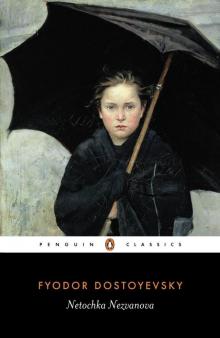 Netochka Nezvanova (Penguin ed.)
Netochka Nezvanova (Penguin ed.)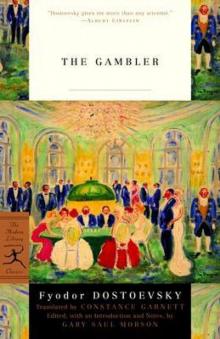 The Gambler
The Gambler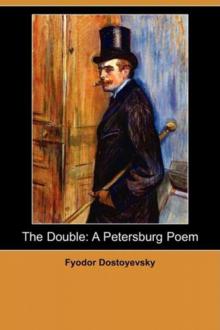 The Double
The Double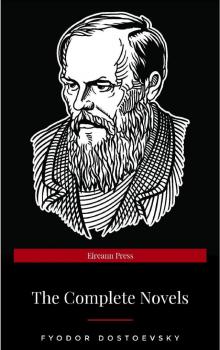 Poor Folk Anthology
Poor Folk Anthology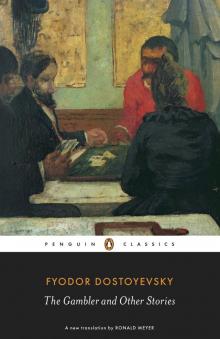 The Gambler and Other Stories (Penguin ed.)
The Gambler and Other Stories (Penguin ed.) Prestuplenie i nakazanie. English
Prestuplenie i nakazanie. English Notes from the Underground
Notes from the Underground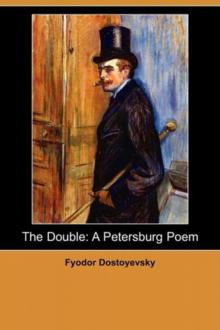 The Double: A Petersburg Poem
The Double: A Petersburg Poem White Nights and Other Stories / The Novels of Fyodor Dostoevsky, Volume X
White Nights and Other Stories / The Novels of Fyodor Dostoevsky, Volume X Complete Works of Fyodor Dostoyevsky
Complete Works of Fyodor Dostoyevsky Poor Folk and Other Stories
Poor Folk and Other Stories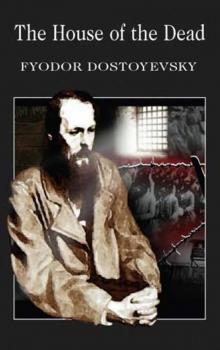 The House of the Dead
The House of the Dead